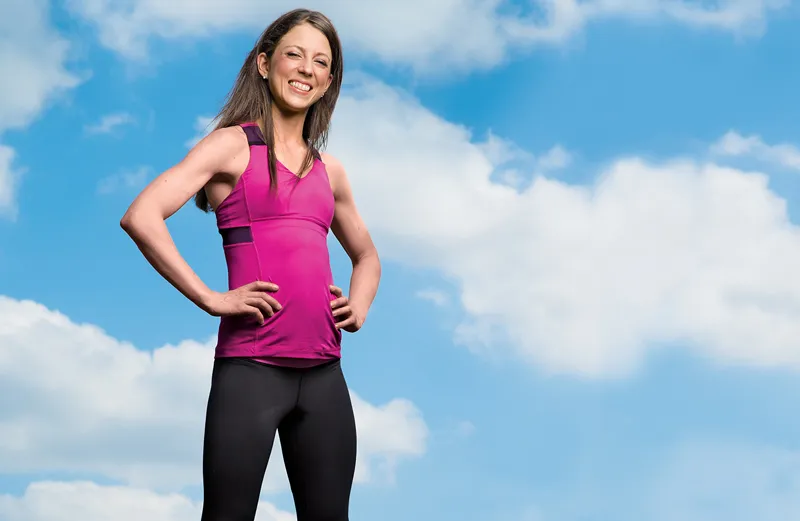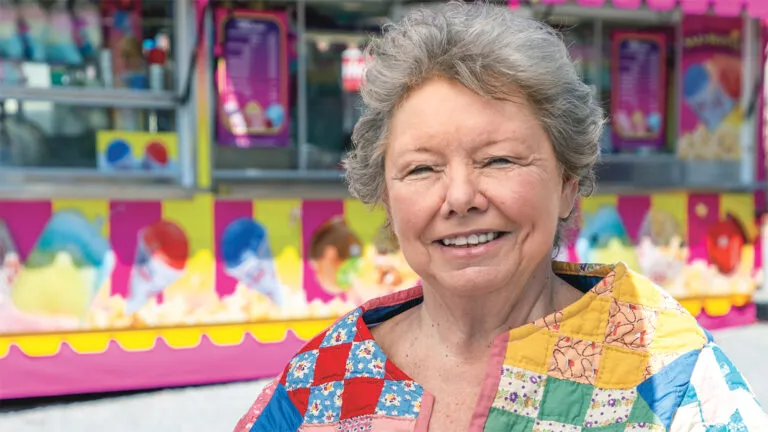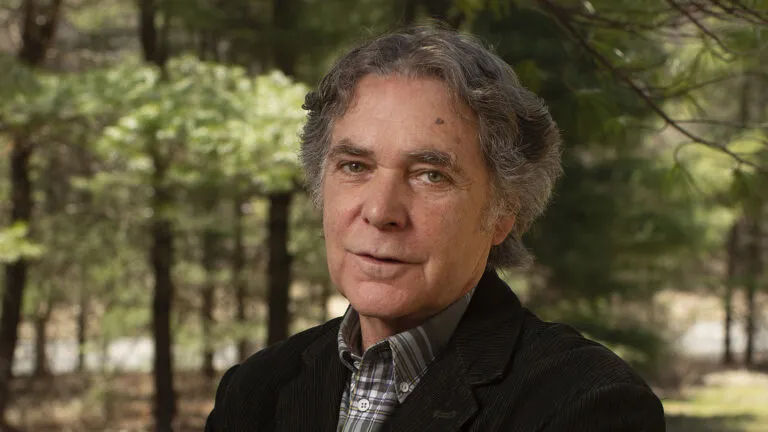A quick glance at the clock on my car radio: 4:38 a.m. Perfect timing. I’d be at the YMCA at five on the dot when they opened the doors and would claim my favorite StairMaster, the one that gave the toughest workout.
My second year of grad school started the next week and I was on four hours of sleep from babysitting jobs, but that was no excuse to skip my two-hour morning workout.
Later, to burn off lunch–one microwaved turkey patty and two pieces of steamed zucchini–I’d squeeze in another two-hour workout at a different gym. If I did all my cardio, I’d treat myself to a protein shake, hit a third gym, and finally, have dinner (another turkey patty).
Healthy food. Plenty of exercise. Nothing wrong with that, right? At least, that’s what I tried to tell myself. Desperately. Earlier that morning I’d stepped on my roommate’s scale: 79 pounds. A number I hadn’t seen since I was 10. Now I was 23.
Deep down I knew I was killing myself. Yet something just as deep was driving this destructive obsession with my weight. I was powerless. I stopped at a red light, rested my head on the wheel, and prayed, Lord, I’m totally exhausted, but I don’t know how to stop. Please help me change.
The light turned green. I headed for the Y, for the machine that was literally my master. I parked and reached in my trunk for the fitness magazines I read religiously.
“Hi, Lauryn, how are you?” someone said. I turned to see eight strangers surrounding me. Not exactly strangers. Fellow gym-goers.
“Uh, hi, what’s up?” I asked. Were they mad I hogged the StairMaster?
A few of them stepped forward. “Lauryn, we’re worried about you. You’ve been withering away. We’re afraid you’ll collapse on that StairMaster. We really want to help. We’re taking you to Vanderbilt University Medical Center.”
Who did they think they were? “Mind your own business,” I snapped. “I’m fine.” But something told me that this time things were serious….
Fourth grade. That’s when it started. I was living in West Little Rock, Arkansas, with my parents and younger brother and sister. I was an overachiever. Driven, I guess–sports, school plays, choir.
One day I chatted with new friends during recess, the popular girls. “I am so fat,” the ringleader declared. “I weigh, like, sixty-nine pounds.”
“Oh, stop,” another girl said. “You are so skinny!” The ringleader smiled, then turned to me. “Lauryn, what do you weigh?”
I froze. I weighed a very normal 80 pounds. If she weighs 69 pounds and she’s fat, I must be huge. If I want to be popular, I’ve got to lose at least 10 pounds. “Uh, I’m not sure,” I lied.
That was my introduction to the negative voice in my head. I’d look in the mirror, slap my face, grip my thighs. “You’re ugly, fat and stupid!” I’d shout. I had to be perfect.
I skipped lunch at school, ate less at dinner. I didn’t care what it took–I wanted all the boys to like me, and all the girls to want to be me.
I lost 12 pounds practically overnight. My parents dragged me to the pediatrician, who ran tests to explain my malnutrition. Anemia? Mono? The flu? All negative. Eventually, an eating-disorder specialist diagnosed me with anorexia nervosa.
Mom choked back tears. “Can this be fixed?” Dad asked. “I mean, she just needs to eat, right?”
“Yes, but she’ll need treatment–weigh-ins, visits with me, a nutritionist and a counselor.”
I did all that, but deep down I didn’t want to change. I lost more weight. My heart rate dipped dangerously low. “You need to be hospitalized,” the specialist told me. “Do you know you could die from this?”
Oh, please. I’m only 11. Don’t they understand I just need to lose a few more pounds? Then I’ll stop.
I did great at the hospital. I’m an overachiever, remember? A people-pleaser too. But I was back to counting calories and skipping meals as soon as I got out.
Home became a battleground where my parents begged me to eat. Between fifth and ninth grade I was hospitalized nine times. I saw a dozen therapists, six nutritionists.
I was sick. I knew it. But I was never good enough for the slave driver in my head. I’d put on a few pounds and that ugly voice would scream, Ugh, you’re disgusting! I read the Bible, praying for freedom from the voice, but it just shouted over my prayers.
Freshman year at the University of Texas, I spent six hours a day at the gym. I wasn’t just anorexic, I was orthorexic–obsessed with making sure the one or two meals I ate a day were pure, healthy foods.
I’d allow myself one protein shake for breakfast. Lunch and dinner were tiny turkey patties with half a zucchini and six (exactly six) pieces of broccoli. If I did all of my workouts, I’d treat myself to a pitcher of Crystal Light lemonade.
Everywhere I went I heard whispers. “Jeez, look at her….” “Anorexic.” “Does she eat?” Didn’t matter. The only thing that mattered was my body, the one thing I could control.
My last semester of senior year, my parents came and took me home. “Lauryn, we love you. Don’t you want to get well?” my mom asked.
“Yes,” I said, but I didn’t believe it. I was doomed to this obsession.
I finished my final two classes online, got my degree and left for Tennessee, for a doctoral program in occupational therapy. (Did I mention I’m an overachiever?) I got three gym memberships so no one would catch on to me. Now eight strangers stood between me and my almighty StairMaster.
I tried to push past them. A man put his hand up. “Lauryn,” he said, “your mom and dad are on their way. Vanderbilt knows we’re coming. Please trust us.”
My head spun. Strangers had noticed something wasn’t right. Not my parents, not doctors. Strangers. That’s how bad I had gotten. I felt ashamed and relieved at the same time. I thought the voice would start screaming. It didn’t.
The ER doctors said my heart was so weak I practically needed a pacemaker. I was tube-fed for almost a month. One more week without intervention and I would’ve died.
I was sent to Oliver-Pyatt, an eating-disorder treatment center in South Miami. Nine months of total lockdown. They watched my every move, drove me everywhere, even flushed my toilet. We ate high-carb foods at every meal.
Exposure therapy, they called it. I called it torture. Still, I sensed something was different.
I felt so disgusting after eating all day and doing barely any exercise. I missed my cardio. I only found comfort in my Bible. Three months into treatment I read from Samuel 16:7: “The Lord does not look at the things people look at. People look at the outward appearance, but the Lord looks at the heart.”
I remembered that verse the next time I was given food I feared–a huge plate of ravioli. I was focused on what I looked like, but God cared about my soul. Could I care about that too? Could I love and nourish myself the way he loved me?
“Go on, Lauryn,” my counselor urged me. “It’s only food.”
She was right. And food wasn’t my god. A StairMaster was not my master. And the voice would stop when I stopped listening to it.
Three years later, you wouldn’t recognize me, thank God. I’m healthy and strong. I’ve taken up a strength-and-conditioning program, and I’m a part-time fitness coach. I love food–especially trying new recipes.
Best of all, I earned my occupational-therapy degree and I’m working toward a nutritional-therapy certificate. My goal is to specialize in women’s health and eating-disorder recovery.
Did I say I love food? That’s not quite right. I love myself because God loved me enough to send eight wonderful strangers to stop me from starving myself to death. Loving great food is a bonus, a truly delicious blessing.
Meet the caring people who saved Lauryn’s life!
Download your FREE ebook, Paths to Happiness: 7 Real Life Stories of Personal Growth, Self-Improvement and Positive Change.






